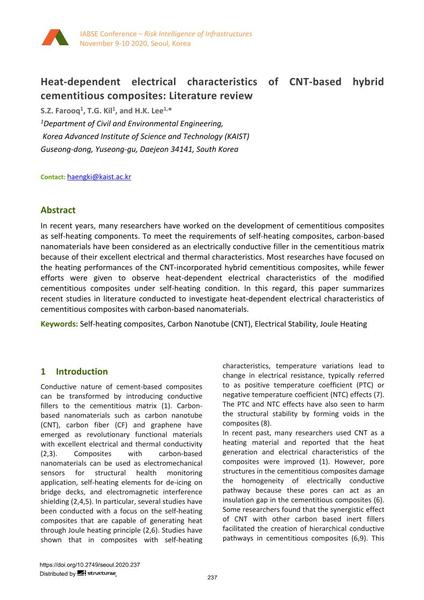Heat-dependent electrical characteristics of CNT-based hybrid cementitious composites: Literature review

|
|
|||||||||||
Bibliographic Details
| Author(s): |
Shah Zaib Farooq
(Department of Civil and Environmental Engineering, Korea Advanced Institute of Science and Technology (KAIST) Guseong-dong, Yuseong-gu, Daejeon 34141, South Korea)
T. G. Kil (Department of Civil and Environmental Engineering, Korea Advanced Institute of Science and Technology (KAIST) Guseong-dong, Yuseong-gu, Daejeon 34141, South Korea) Haeng Ki Lee (Department of Civil and Environmental Engineering, Korea Advanced Institute of Science and Technology (KAIST) Guseong-dong, Yuseong-gu, Daejeon 34141, South Korea) |
||||
|---|---|---|---|---|---|
| Medium: | conference paper | ||||
| Language(s): | English | ||||
| Conference: | IABSE Conference: Risk Intelligence of Infrastructures, Seoul, South Korea, 9-10 November 2020 | ||||
| Published in: | IABSE Conference Seoul 2020 | ||||
|
|||||
| Page(s): | 237-242 | ||||
| Total no. of pages: | 6 | ||||
| DOI: | 10.2749/seoul.2020.237 | ||||
| Abstract: |
In recent years, many researchers have worked on the development of cementitious composites as self-heating components. To meet the requirements of self-heating composites, carbon-based nanomaterials have been considered as an electrically conductive filler in the cementitious matrix because of their excellent electrical and thermal characteristics. Most researches have focused on the heating performances of the CNT-incorporated hybrid cementitious composites, while fewer efforts were given to observe heat-dependent electrical characteristics of the modified cementitious composites under self-heating condition. In this regard, this paper summarizes recent studies in literature conducted to investigate heat-dependent electrical characteristics of cementitious composites with carbon-based nanomaterials. |
||||
| Keywords: |
Self-heating composites Carbon Nanotube (CNT) electrical Stability Joule heating
|
||||
